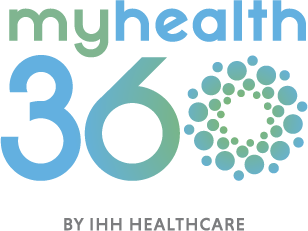Thyroid cancer is the growth of abnormal cells that originates in the thyroid. It is more prevalent in women and commonly seen in those aged between 30 to 60 years old.
What is a thyroid gland?
The thyroid gland is located in the front and lower part of the neck. It is a small butterfly-shaped gland with two lobes, the right and left lobes which are connected by a narrow bridge called the isthmus. In most individuals, the normal thyroid gland cannot be felt or seen.
The thyroid gland produces hormones that affect how your body functions. The main hormones produced by the thyroid are T3 (triiodothyronine) and T4 (thyroxine). They regulate your metabolic rate, which is the rate at which your body processes. For example, these hormones regulate digestion, muscles, and the heart.
The thyroid gland also produces a hormone called calcitonin that works with parathyroid hormone to control the amount of calcium circulating in the blood.
What are the types of thyroid cancer?
The four primary types of thyroid cancer are:
- Papillary carcinoma: This is the most common type of thyroid cancer and accounts for about 8 in 10 cases. It typically grows slowly. However, it may spread to lymph nodes near the thyroid or neck.
- Follicular carcinoma: This type of cancer accounts for 4 out of 100 thyroid cancers and is commonly seen in middle-aged people and primarily women. It may spread to other parts of the body, such as bones or lungs.
- Medullary thyroid carcinoma: This rare type of cancer account for only 2% of thyroid cancers. Approximately 25% of medullary thyroid cancers are caused by an inherited faulty gene. It can spread to other parts of the body, such as bones or lungs.
- Anaplastic thyroid carcinoma: The rarest and most severe form of cancer that accounts for less than 1% of cases. Usually seen in older people and particularly in women.
What are the risk factors of developing thyroid cancer?
The exact cause of thyroid cancer is unclear, but the following risk factors may increase your risk of developing thyroid cancer:
- Older people
- Obesity
- Benign (non-cancerous) thyroid disease
- Family history of thyroid cancer
- Females in their reproductive age
- Genetics: RET gene
- Exposure to radiation
What are the signs and symptoms of thyroid cancer?
The symptoms of thyroid cancer depend on the stage of cancer. Most symptoms are not noticeable in the early stages. Some common symptoms of thyroid cancer include:
- Lump in the front of the neck
- Hoarseness of voice
- Difficulty swallowing (dysphagia)
- Difficulty breathing
- Pain in the throat or neck
- Swollen glands in the neck
- Long-standing sore throat
If you persistently experience these symptoms, you should immediately consult a doctor. Cancer that is detected earlier can be treated more effectively.

How do doctors diagnose thyroid cancer?
Typically, a lump in the throat or neck signals the need to see a doctor. Diagnosis is made based on various investigations. Your doctor would first question your general health, symptoms and conduct a thorough physical examination.
Some of the tests carried out for diagnosis are:
- Blood test
- Your doctor will order a thyroid function test.
- Ultrasound scan
- An ultrasound scan creates an image of the inside of your body using sound waves.
- A lump in your neck that may be caused by cancer can be detected using an ultrasound.
- Biopsy
- If a tumour is suspected, a biopsy of the thyroid will be performed to confirm the diagnosis.
- A tissue sample from the lump can be extracted using a needle and syringe. This procedure is known as fine needle aspiration. The tissue sample would then be sent to the laboratory to be examined.
- Imaging tests
- Computed tomography (CT) scan: A CT scan creates detailed images of the inside of your body using X-rays and a computer. This scan helps to determine the extent of the thyroid cancer spread.
- Magnetic resonance imaging (MRI) scan: MRI uses radio waves and magnetism to create images from all angles of the body and clearly depicts soft tissues. This scan helps to determine the extent of thyroid cancer spread, including abnormal areas in the lymph nodes in your neck.
Learn more about the different types of screening and diagnostic procedures performed to diagnose thyroid cancer.
How is thyroid cancer treated?
The treatment of choice for thyroid cancer depends on the type and stage of cancer. Multiple forms of treatment are typically required.
The key therapies used are surgery, radioactive iodine treatment, hormone therapy, radiotherapy, chemotherapy, and targeted therapy.
- Surgery
- Surgery is the primary treatment for thyroid cancer, except for certain anaplastic thyroid tumours.
- Available surgical procedures depending on the location and size of the tumour include total thyroidectomy (removal of the entire thyroid) and partial thyroidectomy/lobectomy (part of the thyroid is removed).
- Radioactive iodine (RAI)
- Radioactive iodine treatment is a type of internal radiotherapy that is often suggested after surgery to destroy remaining cancer cells.
- The patient is asked to swallow radioactive iodine (liquid or capsule). The iodine travels through your blood, resulting in the destruction of cancer cells.
- Thyroid hormone therapy
- Thyroid hormone therapy may be given after surgery as a replacement for the hormones your thyroid produces as part of thyroid cancer treatment.
- Thyroxine (T4) or liothyronine (T3)
- Targeted therapy
- Targeted therapies are medications aimed at inhibiting the progression of advanced thyroid cancer.
- Tyrosine kinase inhibitors (TKIs)
- External radiotherapy
- External radiotherapy uses high-energy radiation from a radiotherapy machine to shrink tumours and destroy cancer cells.
- Chemotherapy
- Chemotherapy is a cancer treatment that employs potent cancer-killing medications. However, chemotherapy is not commonly used for thyroid cancer unless it has spread to other parts of the body.
Learn more about the different types of treatment technologies to treat thyroid cancer.
What can I do to reduce the risk of developing thyroid cancer?
Thyroid cancer prevention may not be possible for individuals with an average risk of the disease. However, to reduce the risk of thyroid cancer, do minimise unnecessary exposure to radiation, including medical imaging procedures, particularly in young children and in the head and neck region.
Do I need to get screened for thyroid cancer?
There is currently no available routine screening test for individuals at average risk. Although blood tests and thyroid ultrasounds can detect abnormalities in the thyroid, they are only routinely used in those who have a higher risk of developing thyroid cancer.
Genetic testing may be advised for individuals with a family history of medullary thyroid cancer to determine whether they carry the cancer-causing mutations.
Make an appointment at Pantai Hospitals
Early detection of thyroid cancer makes it easier to treat the disease with effective and appropriate treatment. A dedicated multidisciplinary team of specialists and oncologists at Pantai Hospitals is available for consultation to provide the best care and assistance to patients through screening, diagnosis, and treatment.
Get in touch with us to book an appointment today if you have any concerns or questions about thyroid cancer treatment options.
Pantai Hospitals have been accredited by the Malaysian Society for Quality in Health (MSQH) for its commitment to patient safety and service quality.


 Request an Appointment
Request an Appointment.webp?sfvrsn=276ce14_1/vector-(3).webp) International Patient
International Patient

.webp)
 Find A Doctor
Find A Doctor



.webp?sfvrsn=20763f7d_19)
.webp?sfvrsn=f2a2c343_9)




